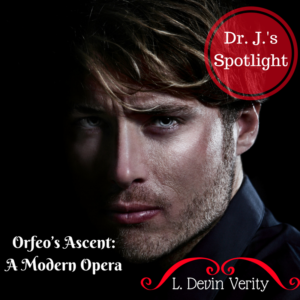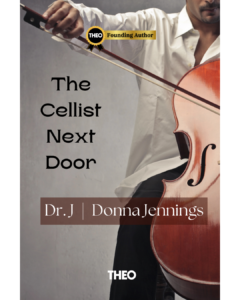Dr. J.’s Spotlight: L Devin Verity

It’s #WriterWednesday. Join me in welcoming a new voice to the erotica writing world. Today, I am sharing my platform with L. Devin Verity, who has woven a tale set in London that touches the heart and the body. For me, setting a stage for an erotic romance in historical fiction is difficult to do. I’m excited to showcase a writer who does it well. Lie back and enjoy an erotic story from another time and place. You can follow her on Twitter. Click on her name above.
Orfeo’s Ascent: A Modern Opera Part 1 of 2
London, 1920
Peter stared at the opera tickets his wife, Anwen, left on the escritoire earlier as she had reminded him of their anniversary. Orfeo ed Eurydice. A dead wife rescued from the underworld. He knew the myth well: great love, tragedy, resurrection. Impossibility.
“We used to love it,” Anwen said, the wistful tone failing to conceal the present bitterness. He’d said nothing, so she’d added the postscript herself: “I know it won’t be like last time, but… ”
The words suspended, her figure disappearing back to her sitting room in the London town home. The last opera concert ended with the clamor of applause and a replaying on the gramophone once they’d arrived back at their country estate: stripping one another of every vestige of clothing in favor of the most indecent and exquisite lovemaking the gentleman ever experienced. The music set his wife aflame with passion she otherwise demurred, and they had only made it to the gramophone in the sitting room, the billiards table providing a level plane for her as he’d tasted her before taking her. Peter’s lips pursed, his eyes closed at the memory as his body tightened, lost in the resonating sounds of her pleasure from long ago.
Now, five years — and a war — later, she expected him to relive the magnificence of the last opera with her? Recapture an ecstasy he knew himself physically incapable of after the horror of his wounds? Couldn’t she understand he was protecting her from the sight of him, from the guilt?
Their marriage withered on the vine of silent, unrequited tension that held taut at every turn as Peter tried to resist and Anwen tried to push. The war still haunted him with physical reminders that he refused to allow her to see. Four months after his return from France, he’d kept her at a distance with the exclusive use of a valet — a man he’d served with in the trenches. The intimacy, the one part of their marriage the world could only guess at and the two of them took such pleasure in, disappeared at Peter’s insistence. She’d tried again and again, to pursue him, to reawaken his desire for her with her nightgown, her bath soaps and perfumes, her rather blunt and open invitations to her bed. He didn’t even look at her in those moments of absolute, tacit refusal and the tone of his voice, though pressed, carried a chill. What did he find so repulsive? Why could he not trust her with his body? She knew he’d been in hospital, knew his chest and leg had been badly injured, but what could be so wrong about her ministrations, her touch to those wounds to resurrect their life together?
Now, on their anniversary, staring into the mirror, she’d determined the celibate life would never work; she loved him, but he obviously didn’t feel the same about her. The form-fitting, tailored chemise and pearl white gown displayed her attractive curves quite tastefully. If he no longer loved her, then perhaps she would catch another’s eye this evening and test her chances in the social circles again as a single woman. After all, neither did anything wrong and their reputations would survive the disruption of divorce without taint or dishonor. There would be whispers, but those would subside eventually and the war proved an acceptable excuse for nearly everything these days. She puffed the flower scented perfume and glanced at the photograph of him with her just before he left for France: his officer’s uniform dashing, his hat off for the photograph, revealing his light hair and intense eyes — gray in the photograph. Her heart ached, the heat of tears forcing her to grab the frame and push its face against the wood of the vanity.
“Never again,” she said. “I’ve loved you through this, but never again.”
After the bout with morphine, the doctor prescribed books, of all things. Peter stared at the Austen novel, dismayed. Stubborn, clever people living in a different time, a time before all of this chaos, he thought, standing by the window. The evening street lamps lit the night, punctuated the doorways and walks with a romantic intensity he’d not noticed before. Couples laughed together or huddled close. He thought of how Anwen knocked on the door to his room last night, invited herself with the sweet smile and hope in her eyes before he crushed her, yet again, with self-preserving will despite his heart pounding at the thought of seeing her become all his again, making her — Why couldn’t they be one of those couples in the street? Carefree and content, intimate amidst the crowd of people. She couldn’t stand the sight of me, he reasoned. God knows, I can’t.
Hamilton, his valet, appeared with the waistcoat and finished helping Peter dress, carefully lifting his collar and completing the tie, covering the scars at the viscount’s neck.
“Will that be all, Sir?”
“Yes, thank you.”
In the car to the concert hall, Peter sat mostly silent, politely complimenting his wife’s attire before retreating into his own thoughts.
“I can’t live like this any longer,” she whispered with hands by her sides in the seat. “I’ll be leaving for my parents’ first thing in the morning.”
He knew precisely her meaning; the opposite of the romantic jests Austen told. His chest pierced with the thought of losing her. A flash of his shirt going over his chest as the valet helped him dress. A yell from outside on the London street startled him; his blue eyes searching for the cause.
Anwen looked and saw his distress. “There’s nothing to be afraid of. I wish — ”
Peter faced her, the street lamps lighting the inside of their car in patterned intervals. She saw the sober desperation in his eyes and heard the break in his voice when he finally spoke. “You wish what?”
The car stopped. Quickly, the driver came around and opened Anwen’s door before she could answer. Peter stepped out on his side and cast a weary glance to the surrounding spectators chatting and walking into the great hall. He’d brought her here during their first month after having taken up together in 1914. The driver gave a brief nod and helped Anwen take the first step toward the entrance, and Peter admired his wife’s profile: rich brown hair luxuriously curled, her nose long and aristocratically angled, and her figure flattered by the silk of the dress she wore. He saw the shimmer and glow of the gown, and his eyes widened, flashed to hers, and caught her staring back at him.
“Are you ready?” was all she asked.
Peter smoothed his white tie and waistcoat. “Ye-yes.”
The couple took their seats, demonstrating a courteous facade to those near them. As the opening chords of Orfeo ed Eurydice began, the zeal and tempo startling Anwen nearly to the point of impetuous applause, Peter kept his eyes on her as much as he did the assembly of professional musicians. The scent of her perfume fused with the heat inside the Hall, intensifying the effects, forcing Peter to concentrate and not lose himself completely in her rather than the music. Peter could tell by the ways her eyes glistened short of the eleventh minute and then lit at the bold chords and powerful bursts of crescendo at the loss of Orfeo’s wife and his stunning grief, that tear drops threatened to spill at her delicate, dark lashes.
Peter, discreet in his movements, removed his handkerchief and made as though he meant to simply lay his arm beside her and placed the silk in her gloved palm. Anwen felt the pressure of his fingers in her palm and glanced to him, lips parted slightly and eyes flickering between joy and something Peter couldn’t quite name. She mouthed the words ‘thank you’ and dabbed at her eyes as she turned, leaving the besotted, anguished gentleman to observe her profile, the tears still escaping. Inexplicably, with one hand still dabbing, the other rested once more beside his hand and, tender, the back of his hand touching hers, Peter’s larger hand opened to reach for hers only to feel her fingers lay instantly in his—willing him to hold hers. Caressing, surrounding her small hand in his, the constriction in his own throat bringing a heat to the back of his eyes, Peter smiled, looked down at his program so as to be inconspicuous, and then gazed straight ahead to the stage.
By the end of Act 2, Anwen disappeared. At the interval before the final act, an usher found Peter and handed him a note.
Please come. – A
“Follow me, Sir.”
The usher led him down a corridor, which twisted around to what must’ve been behind the stage. Before he could speak, the lights dimmed and the usher disappeared.
“Come closer.” Her voice in the darkness.











Recent Comments